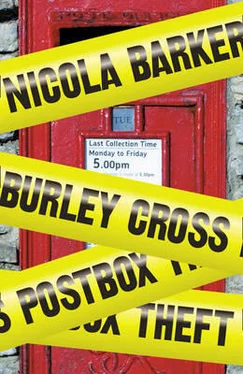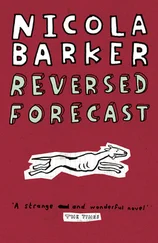Let’s push Rhona to the back of our minds for a moment, though, shall we? (But don’t forget her — heaven forbid! — because she still has a small yet critical role to play in this story.) Let’s think about Wincey again. Let’s think about you, eh?
What happens next? You go home to the pub. You do several hours’ work behind the bar. You’re re-stocking the crisps in the snug — polishing the optics, perhaps — when you chance to overhear a conversation between Kenneth Cranshaw (Sr) and Walter Francis…
Seems that Mr Cranshaw (Sr) has just returned from a council meeting where the old prefab on Sharp Crag Farm has been designated ‘unfit for human habitation’ (at Baxter Thorndyke’s instigation!). Poor Donal Flint is furious about it — it doesn’t rain, it pours, they’re saying; didn’t he just lose three sheep to the fly strike this week?
Your mind turns to the bill for the repair of Duke’s grandfather clock — how you pretended it was just a hundred when it was actually over four… And poor Paula Coombes’s face when you told her — £100! An unimaginably huge amount to her (an unimaginably huge amount to you , right now).
So the next day, when she pops in (still plainly ignorant of the developments on council), you tell her to forget about the repair bill. ‘I’m sure the insurance will cough up, eventually,’ you say. But Paula already has a bee in her bonnet about taking her late husband’s mother’s favourite vase — or decanter — to a local antique shop to see what she can raise on it. And though your every good instinct rails against this scheme (she’s a widow without so much as a change of clothes to her name, the older boy’s a reprobate, all the kids currently have measles), you find yourself giving in to her. You’re so broke! She’s so eager to make it up to you! And the actual bill is four hundred — you kept that fact back from her, didn’t you? To try and spare her feelings?
Poor Paula! So keen to make amends, so full of sincerity and optimism, that you don’t have the heart… you don’t have the luxury… Which is it, exactly? Does it really even matter?
The next afternoon, at lunchtime, you receive a piece of most unwelcome news. Paula’s been in a car crash — on her way to Ilkley, or to Bradley, or to Kildwick — with the blue glass decanter. The van is a write-off. The decanter is smashed. And she doesn’t even know yet that she’s to be made homeless, at Christmas! Five kiddies in tow! You sit in the empty dining rooms, your head in your hands.
It’s then that you receive a visit from Rhona Brooks. She has your scarf and your gloves with her (which you’d left at the church). And she looks so out of place in here, so ill at ease, with her stooping gait, her long, grey, almost nunnish dress, the prominent cross at her neck, those huge, calloused hands. But even so. ‘You seem upset,’ she murmurs, and she pulls out a chair.
So you tell her about Paula Coombes. You tell her about the clock. You tell her about the vase, the bill, the crash. And then, before you know quite what you’re doing, everything else just starts tumbling out. About the insurance, and the numbers, and the articles in the paper, and how broke you are, and last — but no means least — about the charity cash.
‘It’s all such a mess,’ you say, ‘such a terrible mess!’
And you think Rhona will hate you, that she’ll judge you (the way Reverend Horwood judged Duke); a part of you actually wants her to, a part of you actually needs her to. But she doesn’t. She just sits there, quietly, and she listens, her giant hands knitted together, gently, upon her lap. And when she’s done listening, she stands up, and she leans forward, and she squeezes your shoulder, and she nods, then she leaves, muttering something about needing to ‘finish off a hedge, over at the Manor’.
When she’s gone, you wonder if you only dreamed it. And the day draws, inexorably, onwards. Deliveries. A broken oven in the kitchens. The chef threatening to hand in his notice if he doesn’t get a kitchen assistant to help with the chores. Then the cleaner’s a no-show. And the phone keeps on ringing: salesmen, creditors. A coach party arrives, but nobody requires hot meals. One of the toilets gets blocked…
You begin to rail against the world again. How could you not? And it’s the evening already and the barman’s cut his finger on a broken bottle — they’re bandaging it up in the kitchen, so you’re back behind the bar. And Sebastian (just on his way over to post a letter to Prue), pops in for a quick chat about the Auction of Promises. Mrs Goff is there, too, propping up the bar, her face full of sympathy. ‘Numbers not up yet, Wincey?’ she asks, scanning the half-empty saloon.
You’re finding it difficult to talk. Your throat keeps contracting. Your eyes keep filling with tears. You’re so tired — so exhausted. Then Sebastian mentions the money again. The fifth time, is this? The sixth time? And you don’t know what to say, what to do… So you go and grab your cheque book and you write out three cheques — one, two, three of them, signing with a flourish (entirely for Brenda Goff’s benefit): one for the Auction of Promises, a second for the clock repairs, a third for the donkey sanctuary. You address the three envelopes, leaning on the bar. You apply three stamps.
‘Pop these in the post for me, Seb,’ you say, ‘there’s a good lad.’
An hour later, though, and your stomach is in knots. You know there’s no cash to cover the cheques in your account — you’ve already fallen behind on the mortgage. What to do? What to do?
So you throw on your coat and head out. It’s almost nine. You have a small can of lighter fluid in your hand — or a bottle of red wine vinegar. You must destroy those cheques — at any cost — or everything will be lost.
But when you reach the postbox you can’t bring yourself to do it, can you? You just stand there, staring at the damn thing, grinding your teeth with frustration, with rage, with grief, with disappointment. And in a moment of pure, unadulterated pique, you kick out your foot. You land a blow on the box. One, small blow. Then the door pops off.
Good heavens! You take a quick, halting step back. What an unexpected stroke of luck! Then, before you know quite what you’re doing, you’ve fallen to your knees on that icy pavement and you’re feeling around inside, reaching inside, frantically scrabbling your way through the letters (simply intent on removing yours), but then you hear the creak and clank of Susan Trott’s gate. Damn! Now what?! You rapidly tip the entire contents of the box into your coat — or a plastic bag you’ve brought with you (the bottle of lighter fluid, the vinegar, hidden inside it), and you run.
Oh, God! Back in the pub again, upstairs, in your bedroom, turning the lock on the door, you finally return to your senses and wonder what the hell it is that you’ve just done. Am I crazy? you think. Is this just some terrible nightmare? Or could Wincey Hawkes — the respectable pub landlady, an upright member of the community, a gracious doyenne of local charity events, a rock, a brick, a shoulder for all the world to cry upon — have just casually (and with malice aforethought), robbed the local postbox?! A mere five days before Christmas?!
You struggle to draw breath for a while (Am I a thief now? A vandal?), but then your mind turns back to Timmy Dickson, to Baxter Thorndyke, to that stupid argument in the church, and your heart hardens, your resolve deepens. This needn’t be so bad as it seems, you think. You make a plan. A good plan. You think it’s virtually foolproof.
The next day you carry it out. You have an appointment with Mhairi at Feathercuts in Skipton (to get your roots touched up — your red roots). Mhairi’s salon (what a happy coincidence!) just happens to back on to the same, quiet, scruffy back alley as Timothy Dickson’s house.
Читать дальше
Конец ознакомительного отрывка
Купить книгу












